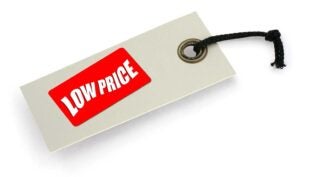
Are you often asked to discount your fee or price?
Typically, when a prospective customer or client balks at your price, it’s because they believe that the value of your offering is less than what they are being asked to pay.
But, not always. There IS another reason. It’s this…
They subscribe to the theory that one should never accept the first price; that every price is negotiable.
In other words, yes, they absolutely believe the value of your product or service exceeds the price. They want to buy. They just want to get the lowest price they can.
We believe that if the fee you charge is appropriate then there is no need to discount it. You are providing absolutely exceptional value and should be making a very healthy profit.
As the first of the Five Laws of Stratospheric Success in The Go-Giver, the Law of Value states:
Your true worth is determined by how much more you give in value than you take in payment.
But They Still Want You To Discount
This can be unnerving, right? After all, you’ve worked hard for this sale. You’ve already invested so much time, research and sweat. You don’t want to lose it. (By the way, all of this is exactly what that person is counting on you feeling.)
Good news: You can maintain your fee.
3 things must be in place:
- You know you are, without question, worth what you are charging.
- You have effectively communicated value that exceeds the price.
- You phrase your response respectfully, confidently, and tactfully.
One of our clients who we’ll call “Brenda” owns a private-duty nursing company. She recently received a call from someone who’d seen her advertisement. It was a woman who — along with her siblings — felt it was time their 90-year-old Mother had a professional nurse with her throughout the day.
Brenda did the discovery, quoted her fee of $30 per hour, and provided a number of references. Her fee is a bit higher than many of her competitors, which Brenda let her know.
Two days later she received a text from the prospective client saying:
“I discussed this with my brother and sister. We’d love to hire you. If you would agree to $25 we’ll go ahead and sign the contract with you right now.”
What Did Brenda Do? What Would You Do?
While $5 per hour might not sound like much, it actually has two effects:
- Over time it issignificantly less money.
- More importantly, it tells you — and the marketplace — that your market value is $25 per hour, not $30.
Brenda texted back a very nice message that said:
“Good morning, Sue! Thank you and I completely understand if my fee is not in your budget. Your Mom sounds lovely and it would be my pleasure to help out if circumstances change.”
Just moments later Brenda received a return text that said:
“Please don’t walk away. We will pay $30 an hour and we’re so excited to have found you. We will make it work. Please reconsider.”
As Brenda Suspected
It simply was a matter of their instinctively trying to get a better price.
Notice what Brenda did:
- Knowing her value she made the decision to stand by her fee.
- Rather than react with disgust, disappointment, or indignation she responded with respect, confidence, and tact.
- She thanked the person, complimented their Mom, and shared that it would be her pleasure to work with them if circumstances change.
Again, because she had done a thorough discovery of what the family was looking for and communicated her value accordingly, plus backed it up further with a number of testimonials, she was very confident that the only reason for the price negotiation tactic being used by the children was because they felt that’s what they were supposed to do.
With that in mind Brenda’s job was to handle the objection correctly, which she did. And the family will benefit greatly, as will Brenda’s company.












